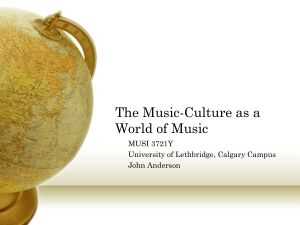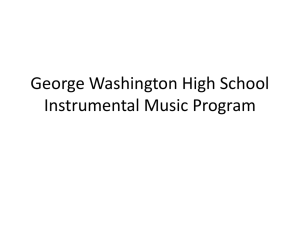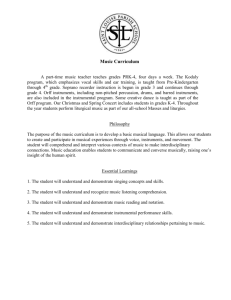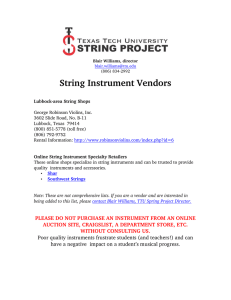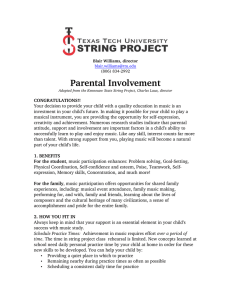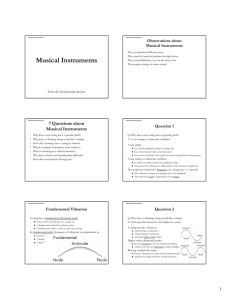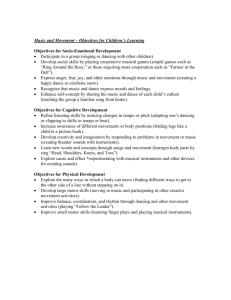Musical Instruments Observations about
advertisement
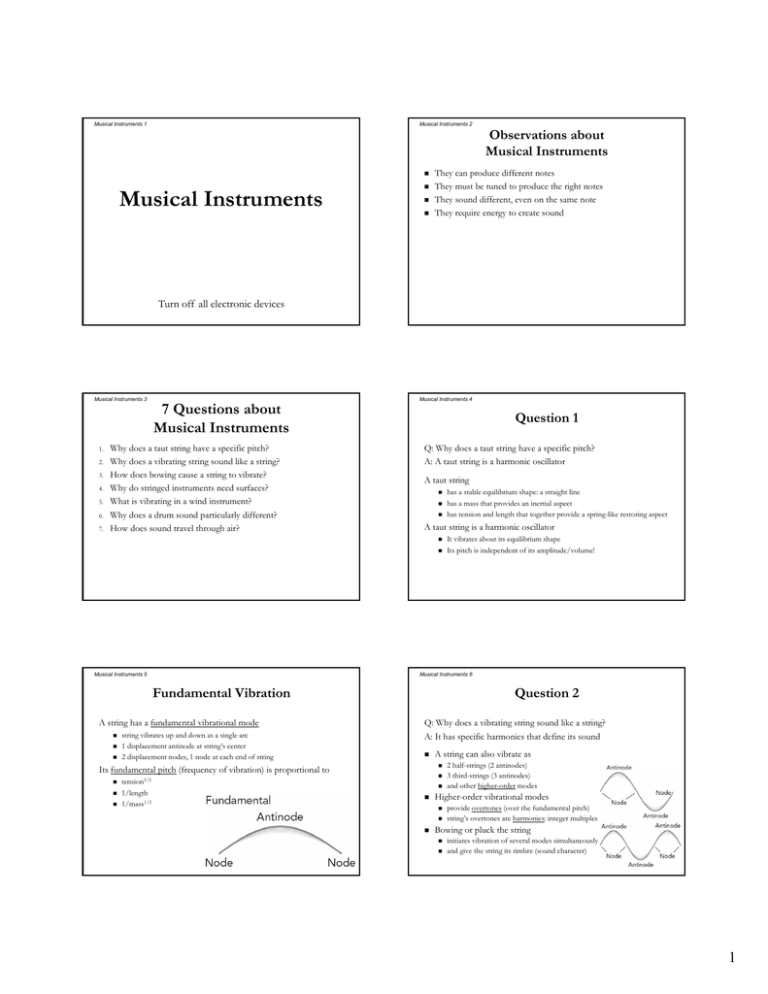
Musical Instruments 1 Musical Instruments 2 Musical Instruments Observations about Musical Instruments They can produce different notes They must be tuned to produce the right notes They sound different, even on the same note They require energy to create sound Turn off all electronic devices Musical Instruments 3 1. 2. 3. 4. 5. 6. 7. 7 Questions about Musical Instruments Why does a taut string have a specific pitch? Why does a vibrating string sound like a string? How does bowing cause a string to vibrate? Why do stringed instruments need surfaces? What is vibrating in a wind instrument? Why does a drum sound particularly different? How does sound travel through air? Musical Instruments 4 Question 1 Q: Why does a taut string have a specific pitch? A: A taut string is a harmonic oscillator A taut string A taut string is a harmonic oscillator Musical Instruments 5 A string has a fundamental vibrational mode string vibrates up and down as a single arc 1 displacement antinode at string’s center 2 displacement nodes, 1 node at each end of string Question 2 Q: Why does a vibrating string sound like a string? A: It has specific harmonics that define its sound tension1/2 1/length 1/mass1/2 A string can also vibrate as Its fundamental pitch (frequency of vibration) is proportional to It vibrates about its equilibrium shape Its pitch is independent of its amplitude/volume! Musical Instruments 6 Fundamental Vibration has a stable equilibrium shape: a straight line has a mass that provides an inertial aspect has tension and length that together provide a spring-like restoring aspect Higher-order vibrational modes 2 half-strings (2 antinodes) 3 third-strings (3 antinodes) and other higher-order modes provide overtones (over the fundamental pitch) string’s overtones are harmonics: integer multiples Bowing or pluck the string initiates vibration of several modes simultaneously and give the string its timbre (sound character) 1 Musical Instruments 7 Musical Instruments 8 Question 3 Q: How does bowing cause a string to vibrate? A: Bowing adds a little energy to the string every cycle Plucking a string transfers energy all at once Bowing a string transfers energy gradually The bow does a little work on the string every cycle That energy accumulates via resonant energy transfer A string will exhibit sympathetic vibration when another object vibrates at string’s resonant frequency resonant energy transfer goes from object to string Musical Instruments 9 Question 4 Q: Why do stringed instruments need surfaces? A: Surfaces project sound much better than strings In air, sound consists of density fluctuations Air has a stable equilibrium: uniform density Disturbances from uniform density make air vibrate Vibrating strings don’t project sound well Surfaces project sound much better air flows easily around narrow vibrating strings air can’t flow easily around vibrating surfaces air is substantially compressed or rarefied: sound Musical Instruments 10 Question 5 Q: What is vibrating in a wind instrument? A: Air in a tube is a harmonic oscillator Air column has a fundamental vibrational mode Air in a tube has a stable equilibrium arrangement: uniform air density The air’s mass provides an inertial aspect The air’s pressure and length provide a spring-like restoring aspect Fundamental Vibration Open-Closed Column Air column has a fundamental vibrational mode Musical Instruments 12 Air Column Harmonics air column vibrates up and down as a single object 1 pressure antinode at air column’s closed end 1 pressure node at air column’s open end The air column in a open-closed pipe vibrates pressure1/2, 1/length, 1/density1/2. vibrates about its equilibrium arrangement pitch is independent of its amplitude/volume! Musical Instruments 11 air column vibrates up and down as a single object 1 pressure antinode at air column’s center 2 pressure nodes, 1 node at each open end of column Its fundamental pitch is proportional to Air in a tube is a harmonic oscillator Fundamental Vibration Open-Open Column like half the air column in an open-open pipe at half the frequency of an open-open pipe In an open-open pipe, the overtones are at 2 × the fundamental (2 pressure antinodes) 3 × the fundamental (3 pressure antinodes) and all integer harmonics In an open-closed pipe, the overtones are at 3 × the fundamental (2 antinodes) 5 × the fundamental (3 antinodes) and all odd-integer harmonics 2 Musical Instruments 13 Musical Instruments 14 Question 6 Drumhead Vibrations Q: Why does a drum sound particularly different? A: Its overtones are not harmonics Most 1-dimensional instruments Most 2- or 3- dimensional instruments can vibrate at half, third, quarter length, etc. have harmonic overtones have complicated higher-order vibrations have non-harmonic overtones. Examples: drums, cymbals, bells Musical Instruments 15 Musical Instruments 16 Question 7 Q: How does sound travel through air? A: Air exhibits longitudinal traveling waves Basic modes of finite objects are standing waves Basic modes of infinite objects are traveling waves Transverse and Longitudinal Waves Some objects vibrate side-to-side: transverse waves Finite strings: transverse standing Open string: transverse traveling Standing wave: nodes and antinodes don’t move Traveling wave: nodes and antinodes travel Open air is infinite, so it exhibits traveling waves Some objects vibrate along their lengths: longitudinal waves Air column: longitudinal standing Open air: longitudinal traveling Musical Instruments 17 Summary of Musical Instrument They use strings, air, etc. as harmonic oscillators Pitches are independent of amplitude/volume Tuned by tension/pressure, length, density Often have harmonic overtones Project vibrations into the air as sound 3

